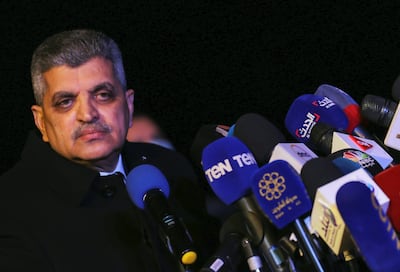Suez Canal chief Osama Rabie has always been upbeat when speaking about the prospects for the international waterway that offers global industry the shortest way between Asia and Europe and earns Egypt about $10 billion a year.
Unlike tourism – another major foreign currency earner for the cash-strapped nation of 105 million – the canal is seen as a less volatile source of income that could be relied upon to keep earning dollars for Egypt, with at least 12 per cent of international trade passing through it.
The alternative – sailing around the Cape of Good Hope at the southern tip of Africa – is expensive, time-consuming and sometimes made perilous by extreme weather, he has often argued.
This week, the optimism and confidence of the 68-year-old former navy commander made way for some grim comments as Yemen's Houthis continued to attack ships in the Red Sea.
“The number of ships decreases every day,” he said in a local television interview. “The region is a war zone.”
The number of vessels transiting the canal dropped by 30 per cent in the first 11 days of 2024 compared to the same period last year, he said.
Tonnage was also down by 41 per cent and dollar revenue by 40 per cent in the same period.

The Suez Canal Authority on Monday increased transit fees, raising them by up to 15 per cent for some tankers, including those carrying crude oil and petroleum products.
“Because of security concerns, commercial ships may prefer longer routes than entering a war zone,” he said. “Even if I reduce tariffs, it won’t have an impact, because these are security fears.”
Yemen's Iranian-backed Houthi forces say their attacks are in support of Palestinians in Gaza and will only stop if Israel halts its relentless onslaught against the coastal enclave which has claimed more than 24,000 lives and displaced more than 80 per cent of its 2.3 million residents.
The shipping decline, which experts expect to continue for months, is not the first body blow to be dealt to the battered Egyptian economy.
The country's lucrative tourism sector had been hit by the war next door in Gaza before the Houthi attacks began in November.
It adds to the list of major problems pre-dating the Israel-Gaza war which the government blames on the Covid pandemic and the Russia-Ukraine conflict.
Egypt's currency has shed more than 50 per cent of its value against the dollar since early 2022. The decline in its value is much worse when calculated using the exchange rate on the free market, where one dollar is traded for around 55 Egyptian pounds, compared to about 31 in the banks.
The three devaluations since March 2022 have sent inflation soaring to record levels, and the foreign currency crunch has suppressed imports, hurting local industries relying on foreign materials.
It has also sent some foreign investors packing and led to harsh government restrictions on access to foreign currency in the banking system.

With an annual import bill of some $100 billion – of which 60 per cent is spent buying food – the foreign currency shortage has led to periodical shortages or steep price hikes of key items, from poultry and cooking oil to rice and sugar.
The shortages and soaring prices were the subject of a heated parliamentary hearing this week that saw politicians openly calling for the dismissal of the Supply and Trade Minister Ali Muselhy.
“The use-by date of this minister and the government in which he serves has expired,” shouted Diaa El Deen Dawoud during the Tuesday session attended by the minister.
“A minister who cannot implement policies must step down,” said another politician, Mohammed Abdel Aleem Dawoud.
The current shortage of sugar has led to long lines at state-run food outlets across much of the country.
“I am running low on sugar at home because I cannot wait for hours in line to buy it,” said a 71-year-old from Cairo who did not want to be named.
The economic crisis and the suffering of middle class and poor Egyptians in the face of soaring prices coincide with Abdel Fattah El Sisi's landslide win in presidential elections in December.
Barring unforeseen developments, the former army general will now be at the helm for another six years, or 16 years from the time he first took on the role in 2014.

He has been the architect and enforcer of economic policies since he first took office.
However, Mr El Sisi has been facing growing calls to sack the government of Prime Minister Mostafa Madbouly amid persistent demands from the International Monetary Fund to meet conditions agreed when the Washington-based lender agreed to give Cairo a $3 billion loan in late 2022.
Most prominent of these conditions are a genuinely flexible foreign exchange regime and the reduction of the footprint of the state, including the military, in the economy.
However, recognising the impact of the Israel-Gaza war on Egypt, the IMF is now considering doubling the loan facility.
In a bid to deflect criticism, a state think tank and data centre directly linked to the Cabinet has published a preliminary economic vision for Mr El Sisi's 2024-2030 term in office.
The proposals failed to alleviate fears of a deeper economic crisis, chiefly caused by excessive borrowing – Egypt's foreign debt stands at $165 billion – and sparked even more criticism of the government's thinking on the economy.
“It's wishful thinking,” said Hassan Al Sady, an economics professor at Cairo university.
“The document does not say how its goals will be achieved and it's focused on even more borrowing.
“We already have been borrowing like a super power with a super economy,” he said.


